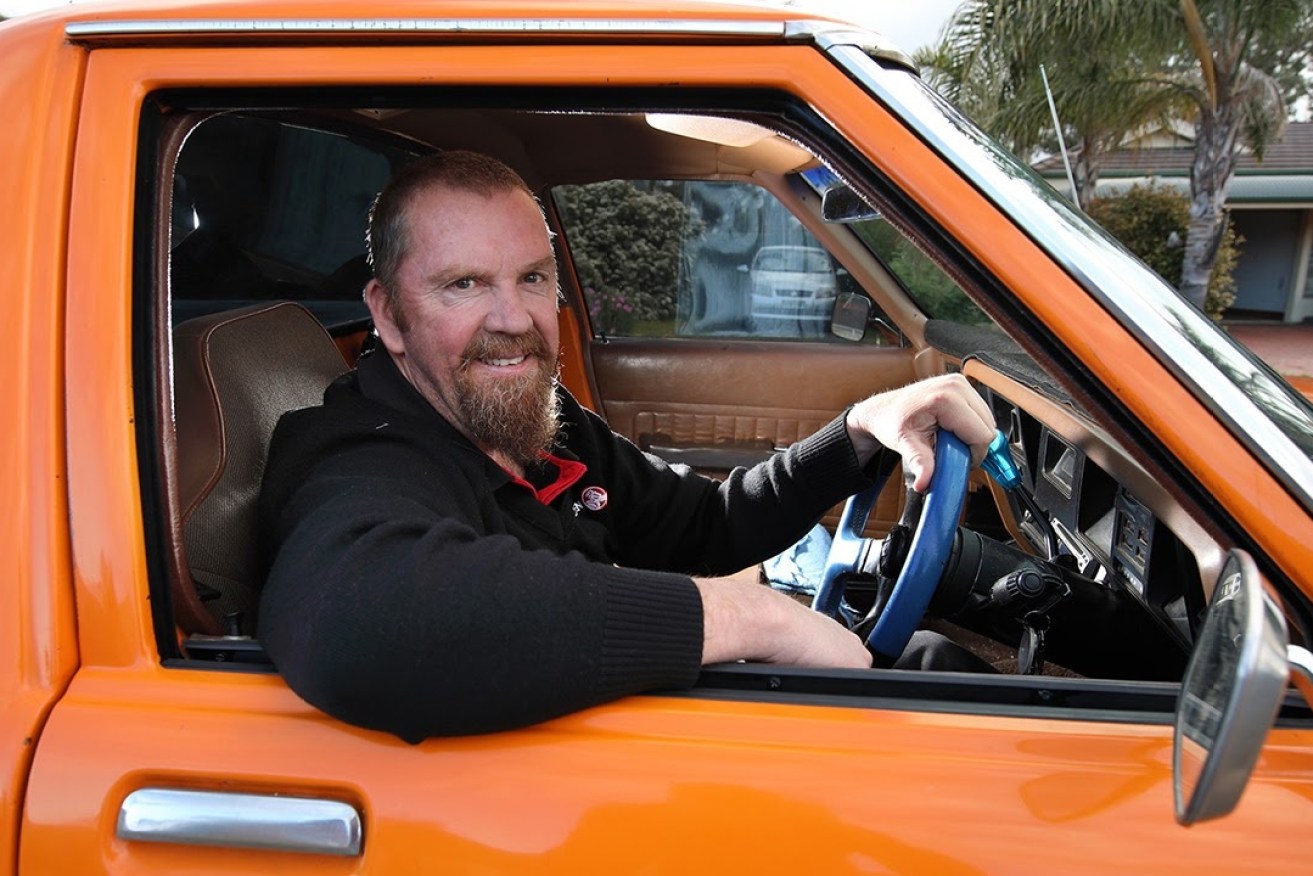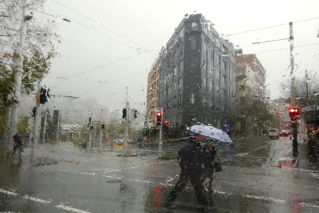‘Holden has been more than a job for me’

Holden worker Keith Hamilton treasures his Kingswood ute. Photo: Tony Lewis / InDaily
Keith Hamilton has worked at Holden for 36 years. Here he gives us a personal insight into what the closure really means for its workers, and says he wants to be there this week – to switch off the lights.
When Holden management called an all-staff meeting three years ago, outside on the grass at the Elizabeth factory, long-time worker Keith Hamilton had no reason to worry. The affable warehouse Team Leader had been at the company for 33 years and was a loyal, hardworking employee. He loved the place, was chairman of the Plant Seven social club and was protective of his team of 15 blokes.
“I remember hearing the word ‘closure’ and me and my mate just looked at each other and said the ‘f’ word,” Keith says. “We just didn’t know what to say. We didn’t know if it was true or not.
“The bosses were on the back of a trailer with a microphone … we were just shocked. And as we walked away I don’t think we said too much. Everything just churned up in our heads. It just knocked us.”
Heading straight home after the meeting, Keith was already concerned for his team, who would be looking for answers.
“The first thing that comes to my mind is I am not doing my job because if they have questions for me, I should have the answers and be able to support them,” the 55-year-old says.
“Back at work the boys were asking ‘who is staying, who is going, what’s going on?’. All I could say is, ‘I don’t know boys. I’m in the same boat as you. I’m concerned myself’. I felt so bad.”
Keith and wife Tania, who works in domiciliary care, have three children, Tammie, 37, Alex, 25 and Josh 20. Keith is a homebody and the family’s Munno Para home boasts a swimming pool and a man cave which is bursting with Holden memorabilia (posters, sticker, an exhaust system hanging from the ceiling), as well as a pool table and a bar. The other pride and joy is Keith’s Holden HZ Kingswood.
Three generations of Keith Hamilton’s family have worked at Holden. His uncle Roy and his late father Des, who started working at the Woodville plant in 1956 and was with the company for 35 years, mainly as a superintendent.
Keith’s son Alex also worked as a casual on the production line for six months and was one of the first casualties of the closure when he lost his job two years ago.

Holden worker Keith Hamilton with his treasured Kingswood ute. Photo: Tony Lewis / InDaily
Keith joined Holden in 1981 as a 19-year-old, applying through the then-Commonwealth Employment Service (CES): “Having Dad work there didn’t help, he wouldn’t pull any strings and say ‘that’s my lad’ – he used to say you get the job on your own merits.”
Keith’s first job was pressing parts in the hardware plant. He recalls those early days as being “dirty and oily” and he also remembers being told to slow down.
“You had to do so many parts a day but I was doing more and I kept getting in trouble from the older workers. I tried to go a bit slower but I couldn’t, it was too hard,” he says.
“The first couple of weeks it was hard work but then as soon as I got the pay cheque, that changed my mind. I thought, ‘I’m staying, this is it – I’ll stay here for life’. No matter what it was like I would have done it because a job’s a job.”
I love it … I just like to be busy and solving problems.
Keith has held a variety of roles at Holden since then, including forklift driver, stacking engine hoods, and sorting parts into colour-coded boxes. He has been a team leader in the warehouse for the past 25 years.
They supply the parts to the production line and Keith can tell you how many parts are in a particular box, how long until the production line runs out and when to reorder.
“I love it,” he says. “I just like to be busy and solving problems and with my job there are a lot of problems that you’ve got to quickly solve. The people are great, the work is great.
“I don’t even really take sickies. I’ve got 1500 hours of sick days owing. Even when I’m sick I still try and go because I don’t want to let the boys down.”
Keith is fiercely loyal to his team, and they know they can go to him about problems, work or otherwise. His team has gone from 15 to six in the past three years.
“The boys say, ‘what cap you got on now Keith – the mum, the dad, the psychologist?’. If they have a problem they’ll say ‘can I have a couple of minutes, Keith?’ and that’s when I’ll know straight away to go into a private room,” he says.
“If they want to get it off their chest with me that’s fine cos I know if they bottle it up they could do something silly.
“I say to the boys, it wasn’t our fault that we are going – so don’t blame anyone here, don’t tell me off, don’t tell anyone else off – it’s not our fault, remember that.”
I have to be there to turn off the lights in my plant on that final day. Like a skipper.
With Friday’s official closure looming, Keith’s support and advice has been much needed. He admits he is worried about his own future.
“I worry a lot, but nobody can see it,” he says. “I speak to the wife if I have to – she calms me down if I’m getting angry about it all. But I have to watch her as well because she may lose her job in domiciliary care – we keep an eye on each other, make sure we don’t get too down.
“I get annoyed because people say, ‘you’ll be right Keith, you’ll get a job’. And I say, ’okay where?’ The hardest part is the interview. If I went and worked for someone for a week for free, I can guarantee I’d get the job, but I haven’t done a job interview for 36 years.
“What makes it so hard is that I don’t want to get a job now because I’m too scared they might want me to start straight away and I’d have to say no because I can’t leave a sinking ship. I have to be there to turn off the lights in my plant on that final day. Like a skipper.”
Keith blames the government for the Holden shutdown – citing moves to slash import tariffs, making foreign cars cheaper than locally-made rivals – and says the knock-on effects are yet to be felt.
“I get annoyed that people getting 20 times more money than me can make such a bad decision and let down so many people,” he says.
“Now there is no car industry in Australia.
“It’s not just Holden, it’s the companies that supply us as well, our safety equipment, our tools. And we might stop and get petrol and a coffee on the way to work, we won’t be doing that any more.
“The guys who may have been planning to build a house may not now, so business will slow down and some places will close down.”

Holden’s production line will cease this week. Photo: Holden
He does praise Holden management who have offered support and advice to staff through their Transition Centre at the Holden plant. Services include how to write a resume, handle a job interview, improve computer skills, as well as professional counselling on how to handle the challenges ahead.
Holden also recently held a jobs fair for its workers. Keith says he’s encouraged his workers to take up all the help on offer, and while he credits the Transition Centre with giving him the confidence to deal with the impending life outside of Holden, he’s anxious about the change.
“I have to have a job,” he says. “If I don’t have a job I’d get into a rut. That worries me. That’s why I need to push myself.
“Holden has been more than a job for me. It’s given me job security, mateship … I love Holden, so it’s great to work with the thing you love – the cars you build.”
Keith describes his future as “grim” unless he gets another job. He finishes up on Thursday, while the plant officially shuts down the following day. But he says his last day will play out just like any other day on the job – except he’ll lose his access card to the place he’s loved for 36 years.
“I’m only guessing but I imagine my boss will come around and we’ll have to hand back our swipe access cards at the end of the day,” he says. “Then security will open the gate and we can just walk out.
“I turn off the lights every day before I go … I always make sure the light are off and the doors are locked and all my workers leave together, we all walk out together. I will walk out with the boys on that day, but it’s really important to me to turn the lights off on that last day.
“It’s part of me coping with the stress, it’s my closure.”
First published on indaily.com.au








